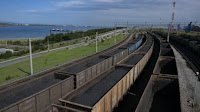What
kind of organization is BRICS?
BRICS, an acronym for Brazil, Russia, India, China and South
Africa, was launched in 2009 as BRIC and later renamed BRICS in 2010 when South
Africa joined the group. It was formed to foster economic, political and
cultural cooperation among its members.
Compared to the Association of Southeast Asian Nations
(ASEAN), the group operates without a formal charter or secretariat -- akin to
an informal group that meets annually to allow for flexibility and prompt
responses to global challenges.
Alicia Garcia-Herrero, a senior research fellow at the
Brussels-based think tank Bruegel, argued in her article on the East Asia Forum
that at the start of the group's formation, China dominated the bloc, and most
of the growth in trade has been China-centric. However, the recent increase,
mostly driven by India, has "experienced an acceleration in economic
growth" of the group.
The five countries combined accounted for gross domestic
product of US$25.8 trillion last year, or about a quarter of the global total,
whereas Group of Seven (G7) developed nations had a combined US$46.8 trillion.
|
Why
do Malaysia and Thailand want to join? |
Participation in BRICS would foster economic cooperation
with peer emerging economies, such as trade and investment.
In addition, Malaysia views this as an opportunity to engage
in rising multilateralism, according to Hoo Chiew Ping, a senior fellow at the
East Asian International Relations Caucus. She said joining BRICS would support
a multipolar world order rather than being drawn into a new Cold War centered
on the US-China rivalry.
Thailand has said a BRICS membership would enhance
Thailand's role as a leader among emerging countries.
A foreign ministry spokesperson told reporters last week
that the country wants to play more roles, promoting Thai potentials to co-play
the roles with developed nations and underdeveloped nations to provide
guidelines for global community development to promote justice and equality,
adding that being a BRICS member does not mean Thailand is taking sides.
|
Will
other countries in Southeast Asia follow? |
Indonesian Foreign Minister Retno Marsudi said earlier this
year that Jakarta was still assessing the benefits of joining BRICS. This
follows President Jokowi Widodo's attendance at the BRICS summit in South
Africa in August last year, during which he called for stronger
cooperation among developing nations to fight trade discrimination.
Jokowi told reporters afterward that despite Indonesia's
good economic relationships with the group's members, we don't want to rush
joining the bloc.
Observers describe Indonesia's reluctance to join BRICS as a
desire to avoid being seen as too close to China, already its biggest source of
foreign direct investment and trading partner in recent years. China has also
been the biggest trading partner to most ASEAN countries in the past decade.
This is amid Indonesia's ambition to join the OECD
instead. The rich-country club opened accession discussions with Indonesia
in February that, if realized, will make it the first OECD member from
Southeast Asia.
Rahul Mishra, an associate professor at the Center for
Indo-Pacific Studies of Jawaharlal Nehru University, said that Malaysia's and
Thailand's moves will motivate Indonesia to revive its BRICS plans. Vietnam
could be the next member, and a bigger BRICS would mean a collective of more
voices from the Global South, he added.
Vietnam sent a delegation to attend the BRICS Dialogue with
Developing Countries in Russia's Nizhny Novgorod this month. The country is
watching the BRICS expansion but has not made any comments on joining the bloc.
Thailand and Laos took part in the forum as well.
What
would Thailand's and Malaysia's BRICS memberships mean for Southeast Asia?
The shift could put a strain on the unity and centrality of
Southeast Asia's own multilateral framework, ASEAN, and the Southeast Asian
bloc needs to adapt to remain relevant as its members explore other alignments,
experts say.
"It is high time for ASEAN to prepare the necessary, to
complement the appetite of its member states in bolstering action and crafting
solutions, in which ASEAN seems to be counterproductive," said Fikry A
Rahman, the head of foreign affairs at Malaysia's research institute Bait
Al-Amanah.
Fikry said that ASEAN will continue to take center stage for
Southeast Asia, and its members will not undermine the values, although he also
pointed out that the nature of the Southeast Asian bloc limits its role in
serving regional goals.
|
What
does a bigger BRICS mean for the world? |
The expansion of BRICS would amplify the voice of the Global
South and point to a further disparity of a more polarized world.
In January 2024, BRICS expanded its membership to include
more prominent Global South countries: Egypt, Ethiopia, Iran and the United
Arab Emirates (UAE), with more countries potentially joining the group.
"The expanded BRICS membership is a direct response to
heightened bipolar rivalry, which has significantly increased global
geopolitical uncertainties," Hoo said, highlighting how middle powers
maneuver amid the tension between superpowers.
However, Hoo cautioned that the inclusion of more countries,
especially with Russia's involvement in the grouping, could send a problematic
signal to the US and its allies, as membership can be viewed as adversarial to
Western interests and values.






